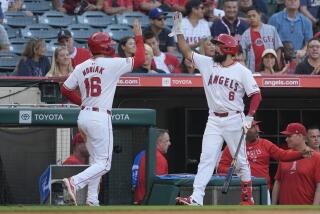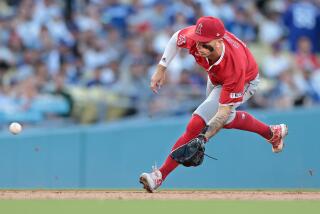Expect Angels to keep hunting
Not only did the Angels snag the most coveted free agent on the market when they agreed to terms with center fielder Torii Hunter on a five-year, $90-million contract late Wednesday, they put themselves in even better position to land a bigger fish -- Florida Marlins slugger Miguel Cabrera -- or a player who could further bolster the offense -- Baltimore Orioles shortstop Miguel Tejada.
General Manager Tony Reagins indicated Thursday that the addition of Hunter, a seven-time Gold Glove Award winner who hit .287 with 28 home runs and 107 runs batted in last season, would not preclude the Angels from pursuing another slugger.
“All I can say is I’m going to be looking at some other things to make us better,” Reagins said. “The winter meetings are coming up, and I’m sure we’ll have more discussions. I’m going to be open-minded.”
By signing Hunter, the Angels could more easily absorb the loss of hard-hitting second baseman Howie Kendrick, whom the Marlins are insisting be part of a trade with the Angels for Cabrera. Florida would also like catcher Jeff Mathis, pitching prospect Nick Adenhart and one of the Angels’ three young starters, Ervin Santana, Jered Weaver or Joe Saunders.
The Angels don’t really want to trade Kendrick, a line-drive machine who batted .322 in 88 games last season and has the potential to hit 20 homers and 40 to 50 doubles a year.
But they would part with Kendrick if he helped net Cabrera, a 24-year-old third baseman who is one of the game’s premier power hitters, having averaged 31 homers and 115 RBIs for four years.
Third baseman Chone Figgins would move to second base, and the Angels’ lineup would look something like this: Figgins, Gary Matthews Jr., Vladimir Guerrero, Cabrera, Garret Anderson, Hunter, Casey Kotchman, Mike Napoli and Erick Aybar.
That’s a lineup filled with power, speed and athleticism, one that, combined with a deep rotation and solid bullpen, should contend for a World Series championship.
If the Angels can’t hook Cabrera, they could turn back to Tejada, whose power numbers slipped during an injury-plagued 2007 -- he had 18 homers and 81 RBIs in 133 games after averaging 29 homers and 116 RBIs for seven years -- but who could be acquired without giving up Kendrick.
The Angels nearly traded Aybar, the young shortstop who is in line to replace the traded Orlando Cabrera, and Santana for Tejada in July 2006.
If the Angels acquired Tejada, they would move him to third base. If they had to give up Aybar in the deal, they could move Figgins to shortstop or possibly look to sign free-agent David Eckstein, the former Angels spark plug, as a stopgap until top prospect Brandon Wood is ready in 2009 or 2010.
That would give the Angels a little more cost control -- Kendrick will be far more affordable over the next five years than Cabrera, and Tejada, who will make $13 million in 2008 and 2009, is signed for only two more years.
The Angels’ lineup would look like this: Matthews, Kendrick, Guerrero, Hunter, Tejada, Anderson, Kotchman, Mathis/Napoli, Aybar. Not quite as potent as a lineup with Cabrera, but still World Series-caliber.
Though the signing of their new center fielder to the richest deal in franchise history seemed to come out of left field -- the Angels already had an outstanding defensive center fielder in Matthews, who is entering the second year of a five-year, $50-million contract, and two established corner outfielders in Anderson and Guerrero -- it was as much a long-range move as one for 2008.
Anderson, the 35-year-old whose offense has slipped because of injuries in the last four years, is entering the final year of a four-year, $48-million contract and is not expected to return in 2009.
Matthews, who will play both corner outfield spots next season while Guerrero and Anderson rotate through the designated hitter spot, can slide to left field permanently in 2009, and Hunter, who spurned a six-year offer from Texas and five-year offers from the Chicago White Sox and Kansas City, would replace the production the Angels hoped to get out of Anderson.
“We’re looking at the long-term health of the organization,” Reagins said. “This move felt right.”
But is Hunter, whose aggressive, acrobatic play in the outfield matches his energetic, effervescent personality in the clubhouse, the big bat Angels fans have been clamoring for since 2005? Even Hunter, 32, isn’t sure.
“I’m a guy who can really change the game -- with the bat, with my defense, running the bases, getting guys pumped up,” Hunter said. “I couldn’t tell you I’m the big bat. Vladimir is the big bat. . . . I’m a player, not a hitter.”
But he could put the Angels one step closer to acquiring that big bat, which would move the Angels another step toward assembling the type of team that can overcome American League powers such as Boston, New York, Cleveland and Detroit and return to the World Series for the first time since 2002.
If that bigger bat doesn’t come, though, “We’re in good shape,” Reagins said. “If the season opened tomorrow, I’d be happy where we are.”
--
More to Read
Go beyond the scoreboard
Get the latest on L.A.'s teams in the daily Sports Report newsletter.
You may occasionally receive promotional content from the Los Angeles Times.







